Pain, death, love, life. How a day goes by in a front-line stabilization unit
Our stabilization unit (or simply “stab”) is located approximately 12 km (7.5 miles) from the front line, in one of the hottest directions. It is at the "stab" that the wounded are evacuated from their positions, wounds are treated, their breathing is restored, their condition is stabilized, and they are sent further to the hospital.
As a volunteer at the Mykola Pirogov First Voluntary Mobile Hospital (VMH-1), I worked for a month at the registration desk at the stabilization unit.
Translated by Dmitry Lytov & Mike Lytov
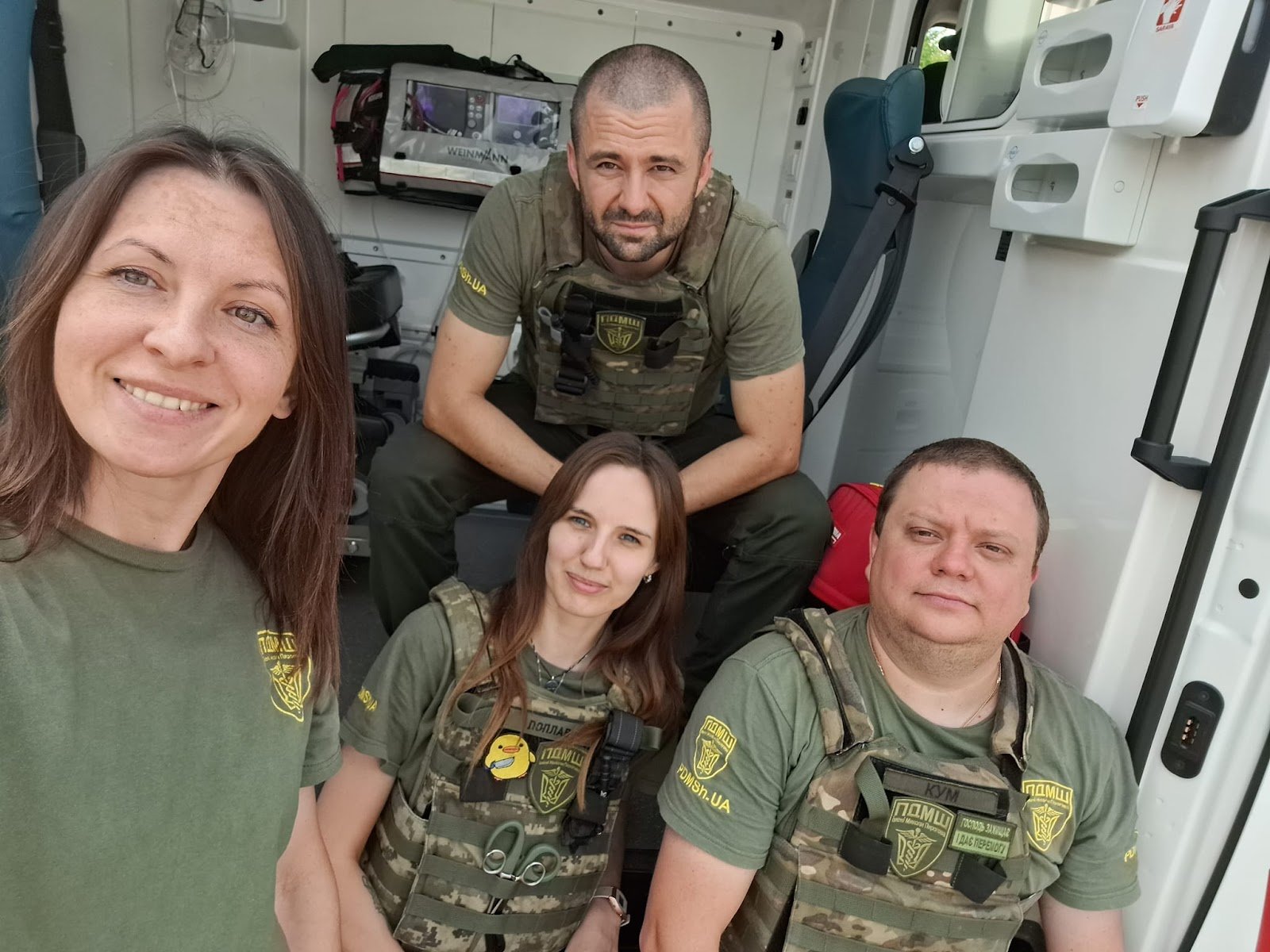
Fighters arrive at the stabilization unit with various diagnoses, mostly concussions or injuries from debris. Less commonly — aggravation of chronic diseases, self-inflicted gunshot wounds, injuries in road accidents, etc.
The doctors of the Mobile Hospital, like other volunteers, strengthen the medical forces of the Armed Forces of Ukraine by providing qualified medical assistance to the wounded. They do it at the call of the heart, without salaries, incentives, or social benefits.
I will tell you what our normal day was like and what was the hardest thing to go through.
The battalion commander’s heart
9:00 am
“Cardiac arrest!”
Through the open windows of the stabilization unit, I can hear a scream. The door of an old green bus with a white cross painted on it slams open, and in seconds, a lifeless body of a stout officer is brought into the "shock room".
“How long have they been pumping?”
“20 minutes.”
A dozen doctors from various brigades of the Armed Forces of Ukraine and volunteer medics shake their heads, there is little hope, but they get down to work: cardiopulmonary resuscitation, indirect heart massage, connection to the ventilator, tracheal intubation. They start the defibrillator.
“Adrenaline! Discharge!”
All those who do not take part in the rescue process watch, holding their breath, through the open door from the corridor, as the officer is reaching out to the other world...
Another 20 minutes pass and — oh miracle — the heart is started!
“It’s started!” someone's encouraging voice is heard from the "shock room".
“Prepare Remka (a reanimation vehicle of the VMH-1, equipped with everything necessary to stabilize the condition of the wounded on the way) for evacuation to the hospital.”
“It’s started!” someone's encouraging voice is heard from the "shock room".
But, as it turned out, it was too early to rejoice. In a few minutes, blood circulation stops again... Doctors continue to fight...
“No pulse? Keep on pumping!”
The IMV (mechanical ventilation unit) is beeping. Syringes are filled with medicines. The eyes of the medics are directed to the monitor, where the vitals remain critical.
The anesthesiologist leaves the operating room, taking off his gloves...
At this time, at the registration desk, the medic who brought the officer fills out Form 100 (for the wounded). The receptionist looks at his bloodied, trembling hands and offers to administer sedative drops. He refuses.
“When I was pulling out the stretcher, I got injured. I wanted to do it as soon as possible...” says the doctor, as if excusing himself.
He wipes his forehead. Sweat drips on Form 100.
“Calm down, sit down. What happened anyway?”- asks the receptionist.
“This is our lieutenant colonel, the battalion commander. In the morning, he complained of pain in the sacrum, he said, his leg was feeling like cotton wool. I immediately thought that his nerve was pinched, and I injected him with diclofenac and ketorolac... We put him in a car to take him to a neurologist. He complained of pain in his back... and fell down... We started pumping...”
The resuscitation took one and a half hours – and ended with a statement of biological death...
"Resuscitation team – stand down!" sounds from the "shock room".
The body is taken to the morgue.
The body is taken to the morgue.
The "stab" is silent for a few minutes... The floor is being washed in the operating room. The earth-colored body of the battalion commander is taken away. His valuables, which were removed during the resuscitation, are put away and handed over to the medics: golden jewelry, and a watch.
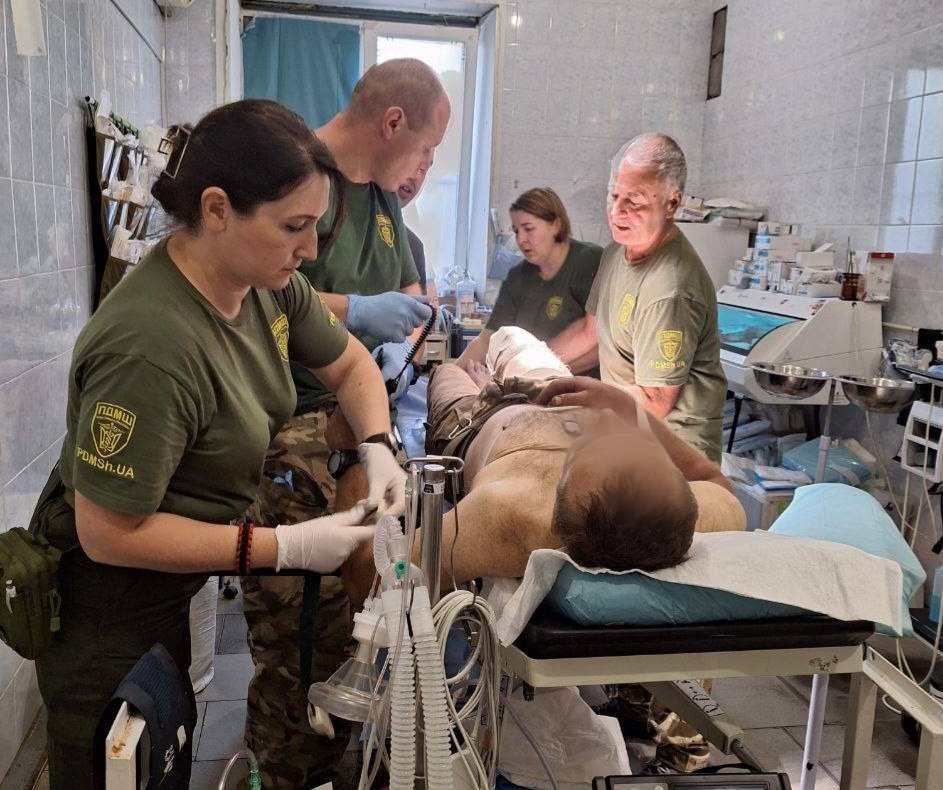
"Acubarics" and embroidered dresses for weddings
11:00 am
At the reception, many Form 100s are filled out again – this time for foreign volunteer fighters from Latin America. They only speak Spanish. The medics communicate with them through Google Translate.
“Do you feel sick, do you have a headache?” - asks the nurse, entering the words into the translator by voice input.
The volunteers nod.
“It will be easier now.”
Right in the corridor, they put venous catheters, inject antiemetics, and painkillers. And also magnesium solution, which corrects high pressure.
Form 100 states: "acubarotrauma, cephalic syndrome". This is a standard diagnosis we see in every second wounded person who ends up here...
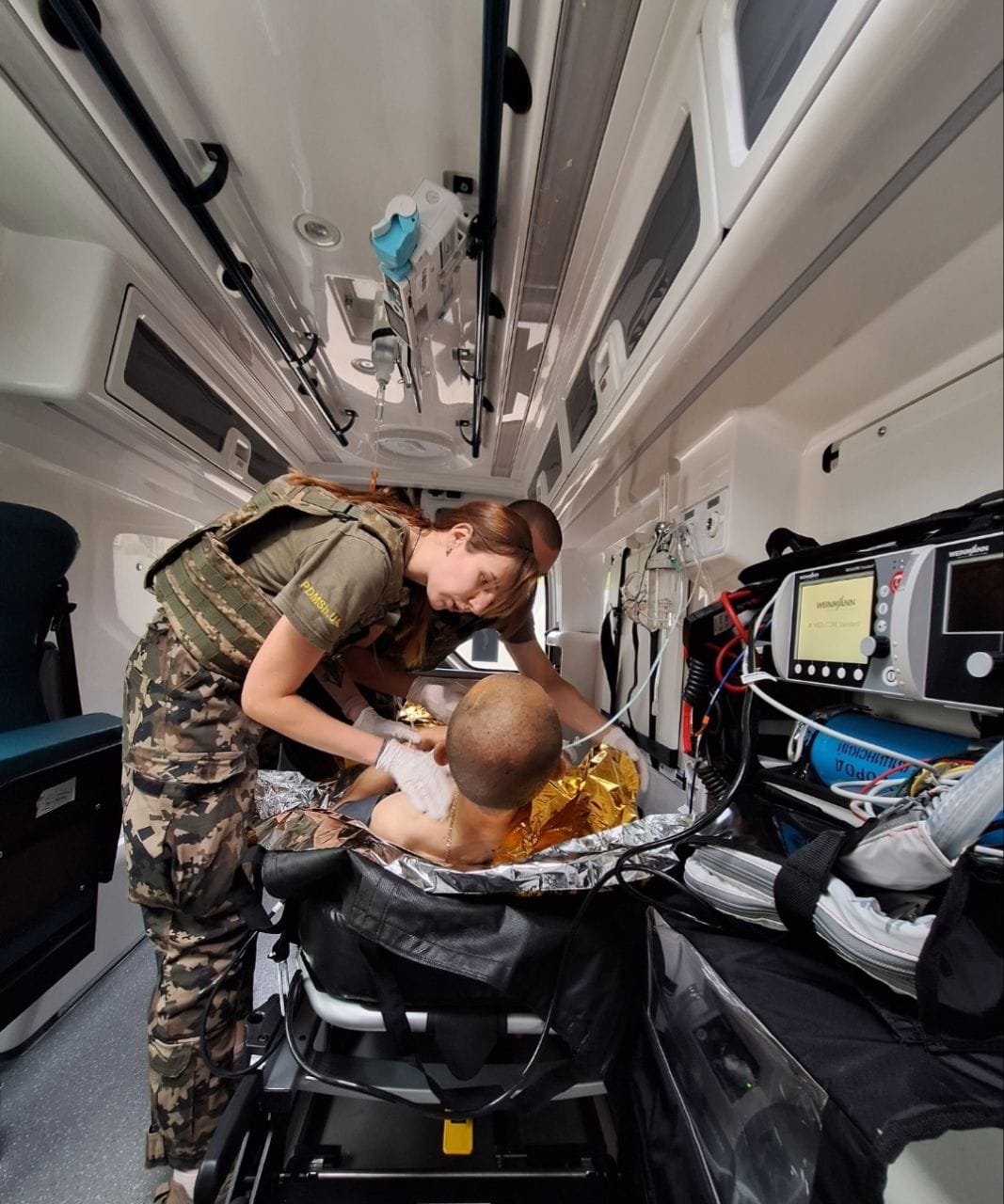
11:20 am
There are a few minutes left for a smoke break. Everyone steps out onto the porch, where a friendly mongrel is sprawled out on her back; she has seen more than many of us who have only been on rotation for a month. She is allowed to spend the night at the "stab". And she is sure to poke all the visitors with her tummy to pet.
Armored vehicles and tanks pass by.
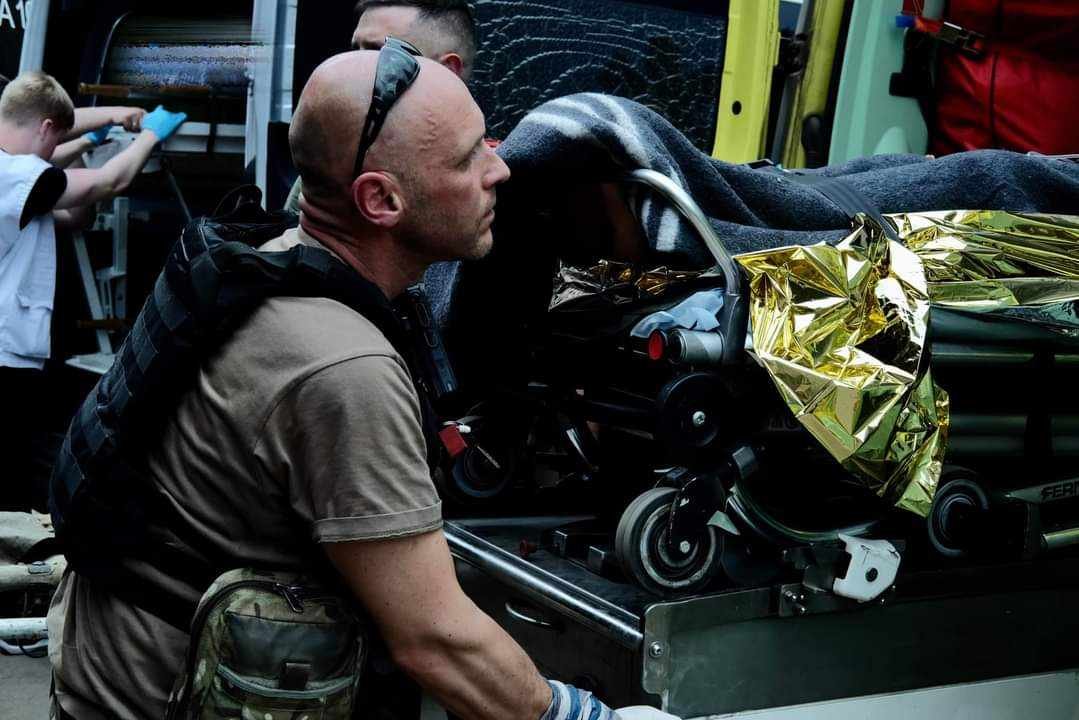
“Will someone go to the post office?”, a girl asks her colleagues. She is a new medic who was delegated to the "stab" directly from the positions. “Could you please pick up my parcel?”
“OK. And what have you got there, is it alcohol by chance?” laugh the brothers-in-arms from the car with the inscription "300". It must be understood that the law is strict in the Donetsk region and even at the post office parcels with alcohol are not allowed through.
"It’s two embroidered shirts - mine and my boyfriend’s," she says. “He also sent me a wedding ring by post. As soon as we get out of positions and have at least one day off, we will get the marriage record. But for now – he is out of reach... He is a sapper, they don’t rotate every 2 days like the others. They are kind of stuck there in that damned forest...”
The girl lowers her head and sighs. But then she jokingly adds that he probably didn't make the offer just for fun - both of them risk their lives here every day, so if something happens to one of them, the other one will get a big payout... Everyone laughs, although it's not funny.
11:45 am
The ambulance siren wails. Everyone puts out their cigarettes. "A difficult patient," everyone thinks to themselves and gets ready without an order.
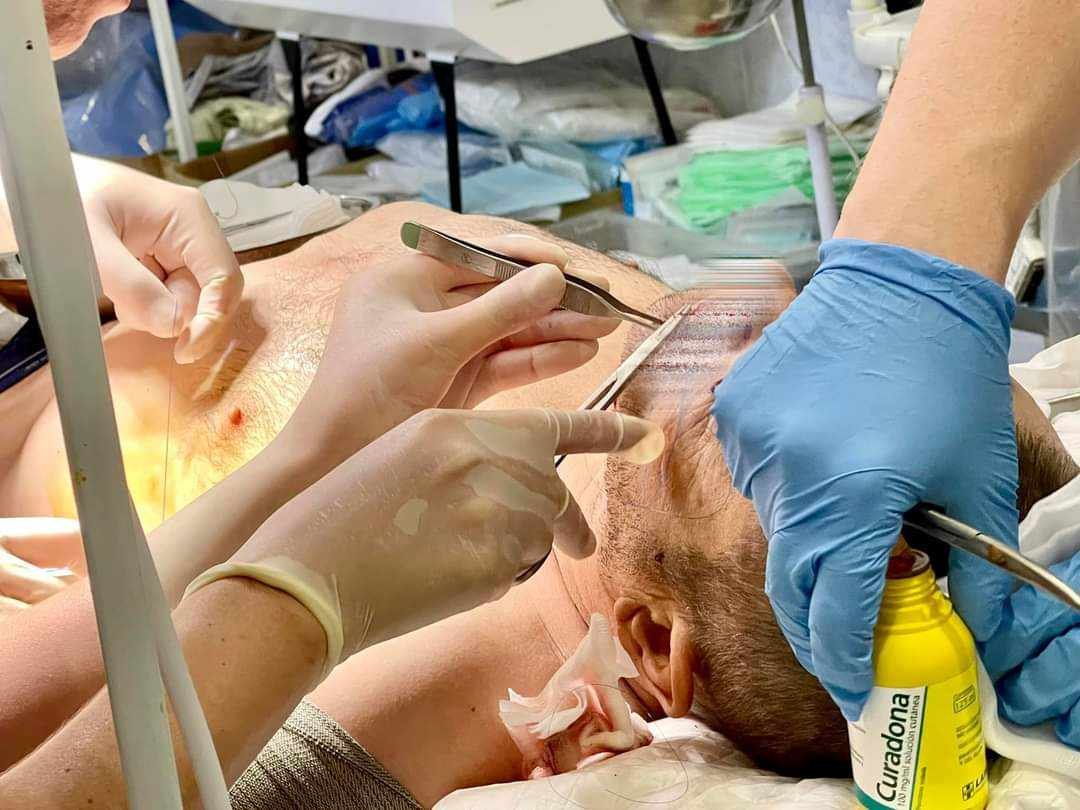
The wounded with a traumatic amputation of a limb is carried out on a stretcher from a car with a white cross. A young man, born in 2000, conscious. He moans. There are two tourniquets on his legs. But he lost a lot of blood.
“A difficult one? Get him to Operating Room 4!” commands the surgeon.
His clothes are soaked in blood and need to be cut all over. The patient lies completely naked. His legs look like a sieve, all in holes. The foot on one limb is missing, the leg is disfigured to the knee - he stepped on a "petal" (a type of anti-personnel mine).
"Friend, have some patience, now it will be easier," the doctors reassure, smile, and quickly get to work.
At the registration desk, they cannot find out the fighter's last name. The doctor who brought him has already left. We look into the operating room to ask the wounded man himself, but he is already intubated (in medical slang - "on a tube"), under anesthesia...
Although it will not be possible to save the limb, doctors are fighting for his life, which, like the leg, is also hanging by a thread, because too much blood has been lost. A urinary catheter is inserted. The medics tampon the holes in the leg, sew up the wound – so big that one can put their palm inside, immobilize him by placing the leg on a splint and wrapping it with bandages. Three hemocones (plastic containers for blood) and the same amount of plasma are infused.
“We still need liquid blood, Group A negative. Who has one?” asks the anesthesiologist.
Up to half a liter of blood is drained from the doctor. This is a common practice among the medics here.
Up to half a liter of blood is drained from the doctor. This is a common practice among the medics here.
“Let the doctor go, the "acu-barics" are already waiting for him,” a voice is heard from the corridor.
While the severely wounded man is getting treatment, his personal belongings are packed: a flashlight, lighter, and berets are intact, but completely covered in blood, clean shorts and a T-shirt are added... The whole thing is put in a black bag and the soldier's name is written on a patch.
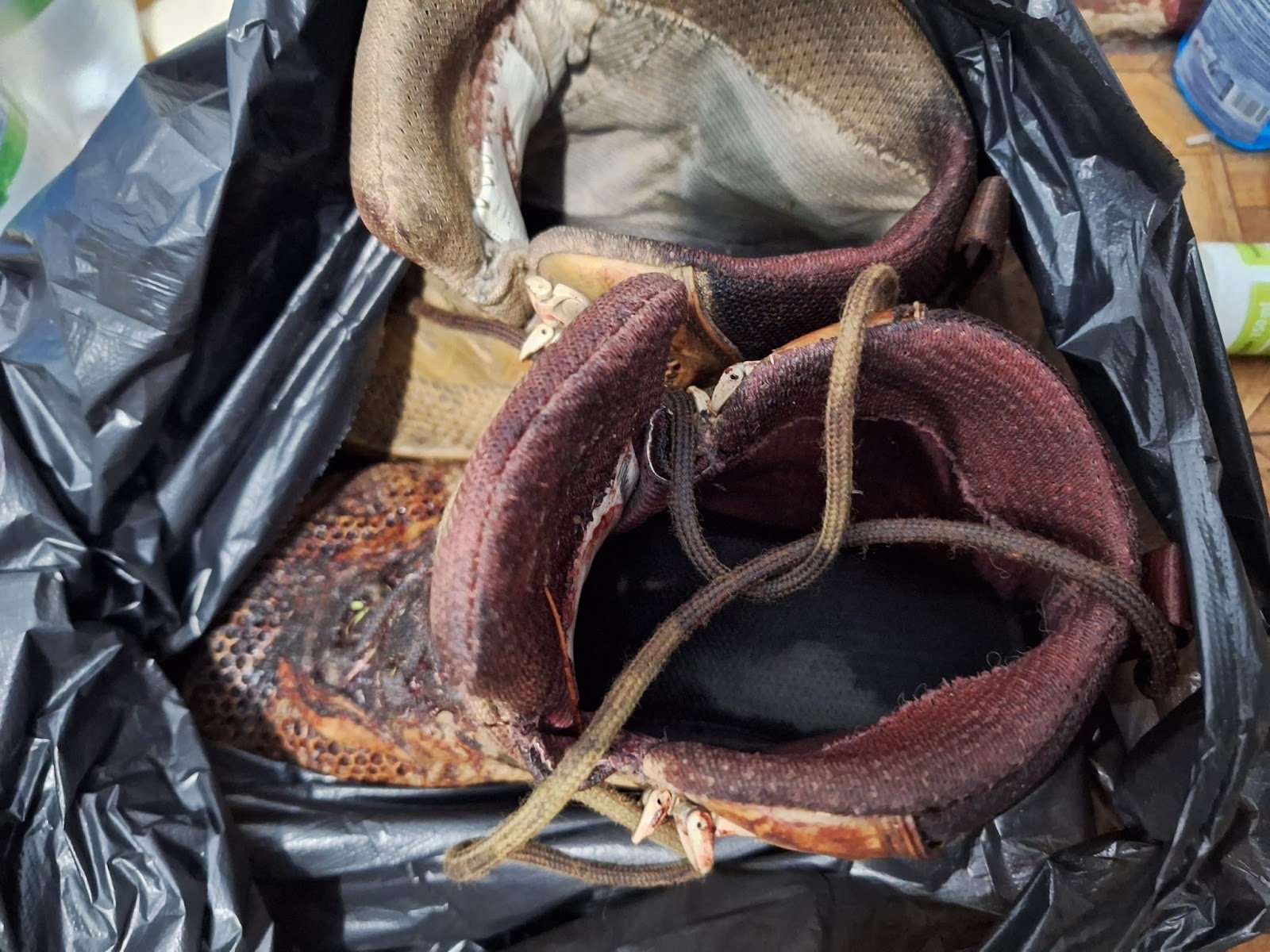
Five soldiers are standing in the lobby. They are concussed, with gunshot and shrapnel wounds.
"And that's not all," sighs the company medic who brought them. “The serious ones were immediately taken to the hospital.”
“What is going on there?”
“Our reconnaissance squad went to mine something and the enemy began shelling…”
On the "bed", one fighter shudders when he sees a syringe, he does not allow the paramedics to insert a catheter...
“I am not afraid of explosions as much as I am afraid of injections.”
The nurse reassures and makes an unexpected offer:
“Hold my leg if you want! Right here, at the thigh. When will you have such an offer again?”
The nurse tries to calm him down: “Hold my leg if you want! Right here, at the thigh.”
The fighter grabs the thigh, holds it tight and closes his eyes. This way he feels less pain, just as was expected.
It can take several minutes to hours from the arrival of the wounded at the station to the evacuation. Everything depends on the condition of the wounded and the availability of several "easy" ones for evacuation: nobody will drive the car for 30 km just for a single soldier. Sometimes, the wounded just leave without notice... They just get together and go, dressed in flowery shorts and pink t-shirts from the humanitarian aid (their own clothes are often dirty or cut, so they receive clean ones instead), turning off their phones and dropping off Form 100s... There was one such person that day.
War is war but lunch is still on schedule (a proverb)
1:00 pm
No matter what, the cook calls us for food. He has a bandaged leg, a single finger on his hand and a kind toothless smile.
“Borscht for lunch today.”
The doctors cheerfully trudge to the second floor, to the dining room. A huge pot of delicious borscht on meat broth is a small joy for the day. Everyone fills their bowls. Those who want to cut some sausage to make sandwiches.
"Fruits were not delivered today," informs the storekeeper. “But they will be tomorrow, they promised...”
3:00 pm
There are three people with acubarotraumas in the hall, sitting on a bench. They are all officers: two captains and a first lieutenant. They say: "We don't need to go to the hospital, we're going back to the unit." The doctors refuse, because concussion is a serious thing, they need to recover just a little while. But the patients are stubborn.
“We are officers, the soldiers can’t do anything without us, how can we leave them in their positions? There is such a mess... We have to go back. Inject something, give us a pill, and we're leaving.”
In the Form 100, they write: "send to the unit", because it is useless to argue with officers.
“We are officers, the soldiers can’t do anything without us, how can we leave them in their positions?
They say goodbye, one of them plays music on the phone "Silence, I want silence...".
In the corridor, several soldiers are waiting for their turn to be evacuated. We talked to them, learned that they had not eaten for two days, were sitting in the trenches, and were only relieved today. They get sandwiches and warm tea. In general, patients with concussions are not allowed to drink or eat, because they will get sick on the way. But there are exceptions.
"When I was at the positions," says the medic, "I ate a can of stew and a pack of ramen, and that was it for two days. On one hand, you just forget about your hunger under shelling. And on the other hand, if you eat, then you have to go to the toilet somewhere, damn it... And there is no way to heat it, that canned stew is already making me sick...”
"Give me the keys to the morgue"
4:00 pm
The already familiar driver of the car with the inscription "200" silently points to the shelf. There is a small key on a blue-yellow ribbon woven with a pigtail. This is the key to the morgue. I silently hand him the key.
“Can someone help me carry the body?”
A few people come forward. The military card of the fallen soldier remains on the table. He was 35, a first lieutenant, handsome, a manly appearance in photographs. Most likely, the family is not yet aware that their universe has just collapsed...
The officer’s bloodstained body is pulled out of the car on a soft stretcher. The key opens the door, the body is placed in a bag and taken inside. No emotions. Not a single tear was shed. You can't show your weakness here.
There are so many deaths here that they become a routine: to give the key and a Form 200 log, to yell at someone who incorrectly logged who brought / took away the body. What's more, they often joke about death.
No emotions. No tear shed. You can't show your weakness here.
"Imagine," says the doctor. “We were at the evacuation, tried to pump out a soldier and found that he was a number 200. We took him to the morgue. We went for the keys, came back, and our number 200 was sitting on a stretcher! We almost died because of the shock. For the first time in our life, we were glad that we had such bad roads - it looks like the shaking woke him up..”.
Almost all medicines and medical kit components here were received from volunteers.
Another soldier is brought in. While the registrar is filling out Form 100, the medic complains that the Chinese occlusion sticker she had put on the chest of a wounded man with a pneumothorax (air entering the pleural cavity due to a punctured lung) has come off. She asks the medics at the "stab" if they have another sticker that sits better, and gets one. Almost all medicines and components of first-aid kits here were received from volunteers.
4:30 pm
Once again, the combat medic is at the doorstep. This time he is looking for a certain fighter.
“Yesterday you took him to Sloviansk, to the hospital. I go there, and they tell me that he is already in Dnipro. So where should I look for him? He was unconscious, I had his phone, and of course, he went to the position without the phone, so I lost contact with him…”
We look for the contact of the hospital in Dnipro, and share all available information with the medic. Later, he will bring us a chocolate as a token of gratitude, and we are not allowed to refuse.
At this time, I received a text message that the commander of the unit, from which the unconscious soldier delivered to us the day before who we could not obtain comprehensive information about was, was on the phone. I call this number back. The commander asks a lot about his fellow, says that the shelling just ended and he returned to the COP (command and observation post), he could not speak before…
Meanwhile, another soldier arrives at the "stab" looking for his comrade’s weapon, because his machine gun was lost during the evacuation of the wounded, and this will cause problems in the unit... We just shrug, because he was brought to the "stab" with nothing...
"In the army, things cannot be missing, they can only be f**ng lost because of neglect," the soldiers joke.
A soldier with a suspected open craniocerebral injury is taken to the first shock unit. His head was all bandaged. Some medic wrote on his bare torso that he got injections on the road.
“Call Remka (reanimobile) to take him to the computer tomography asap, then to Slavik,” the head of the medical station commands.
Remka arrives within 2 minutes. Six people put the soldier on a hydraulic stretcher and took him away.
Meanwhile, another patient is brought to the second operating room with his eyes closed - shrapnel got into them. And also has multiple GSW (gunshot and shrapnel wounds) of the upper limbs...
The doctor who fills his Form 100 blinks his eyes and complains that his vision has deteriorated from the blast wave, and he only recently had laser correction... He asks for Advil for himself. And chocolate.
Ghost hunting with a Kalashnikov rifle
6:30 pm
We finish a third bottle of energy drink, which is provided to us every morning by a medic from one of the brigades that brings the wounded. We hear an explosion very close by. Not a single person in the room even batted an eye. The head of the medical station jokes that someone's nightstand upstairs fell. Everyone laughs and continues to work.
“A penetrating wound in the stomach. But not heavy. Bring him to the second operating room!”
The guy is covered in sand and limps down the corridor with a tourniquet on his leg.
"Oh, I remember him," says the nurse. “In two weeks, he is being brought back for the second time. I had a concussion and again... A guy from my village.”
"And one of my soldiers has an acute reaction to stress," says a fellow soldier sitting in the corridor. “He doesn't sleep well; he hunts ghosts at night. It would be fine, but he is shooting at them with a Kalash, so we are afraid that he might hit someone...”
Involuntarily, one of us smiles, but the soldier does not laugh at all.
"If you ever had been to that hell..." he says. And immediately he starts: “But better not go there!”
Some of our doctors remain on night duty. When it's dark, fewer wounded people are brought in, because not everyone has thermal imaging devices. And it is difficult and dangerous to move without them. Therefore, we have to wait for the morning. And again, the same in a circle.
"This is war, bro" is a favorite phrase here at the front. This is how you can answer any question.

